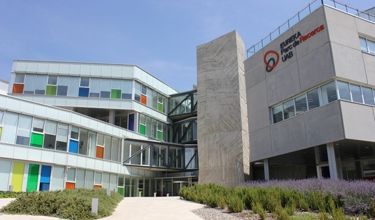
08/10/2015
Good News for Two PRUAB Spin-Offs
Good News for Two PRUAB Spin-Offs
PRUAB is a key structure in the Barcelona Synchrotron Park environment: this foundation aims at transferring technologies, transforming results obtained in the 30 UAB University research centers (4,000 researchers) into new products, patents, spin-offs or stat-ups and offering local companies innovative solutions based on these scientific results.
Ypsicon is one of these spin-offs created in 2011, based on the development of the so-called UHPH technology that offers a continuous system and procedure of sterilization and physical stabilization of pumpable fluids by means of ultra-high pressure homogenization. This technology allows the preservation of beverages, liquid foodstuffs and pumpable fluids for long periods of time without refrigeration, and reducing the need for additives and preservatives. Last month, the United States Patent and Trademark Office granted Ypsicon's UHPH patent. With this approval, Ypsicon obtains the exclusive control of this technology in the world's largest economy after those already obtained in China, Japan, Australia and Europe.
Oxolutia is another example of PRUAB spin-offs created in 2010 with the initial mission to develop technologies based on chemical solution deposition for continuous production of second-generation high temperature superconductor tapes. The new Solar Oxides project offers flexible photovoltaic solar cells that can be manufactured by 3D printing. Using conductive oxides, a non-toxic, stable, and low-cost material found abundantly in nature, the cells open up exciting new opportunities for generating low-cost solar energy. This project was recently selected by the Repsol foundation to join its portfolio of entrepreneurs. This foundation backed by the multinational energy company acts as an incubator to give support to projects that provide innovative solutions in the field of energy.
Image: Eureka building, PRUAB headquarters
Ypsicon is one of these spin-offs created in 2011, based on the development of the so-called UHPH technology that offers a continuous system and procedure of sterilization and physical stabilization of pumpable fluids by means of ultra-high pressure homogenization. This technology allows the preservation of beverages, liquid foodstuffs and pumpable fluids for long periods of time without refrigeration, and reducing the need for additives and preservatives. Last month, the United States Patent and Trademark Office granted Ypsicon's UHPH patent. With this approval, Ypsicon obtains the exclusive control of this technology in the world's largest economy after those already obtained in China, Japan, Australia and Europe.
Oxolutia is another example of PRUAB spin-offs created in 2010 with the initial mission to develop technologies based on chemical solution deposition for continuous production of second-generation high temperature superconductor tapes. The new Solar Oxides project offers flexible photovoltaic solar cells that can be manufactured by 3D printing. Using conductive oxides, a non-toxic, stable, and low-cost material found abundantly in nature, the cells open up exciting new opportunities for generating low-cost solar energy. This project was recently selected by the Repsol foundation to join its portfolio of entrepreneurs. This foundation backed by the multinational energy company acts as an incubator to give support to projects that provide innovative solutions in the field of energy.
Image: Eureka building, PRUAB headquarters
More news
03/01/2020
AllRead MLT, a success story originated from the PRUAB’s Ideas Generation Program
06/11/2019
SENER, a top-class aerospace systems provider
29/10/2019
The ICN2 research center is involved in the quantum revolution
21/10/2019
Stradivarius keeps growing
19/09/2019
The president of Catalonia visited the Barcelona Synchrotron Park
12/09/2019
Alba, a tool to tackle challenges in the fields of renewable energy production and fight against air pollution









